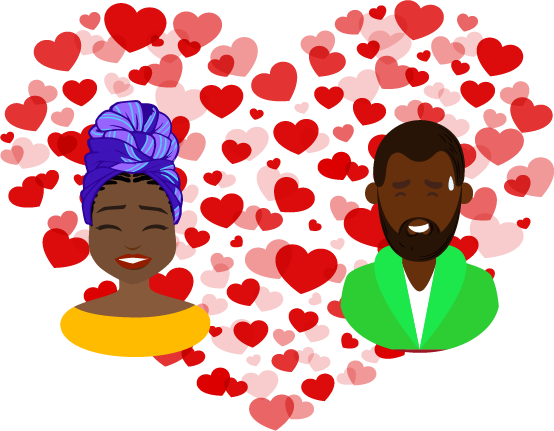How to say "I love you" in Twi
Impress your crush with these five phrases for expressing admiration, interest, and love in the Twi language.

1. Me dɔ wo - I love you
Sentences in Akan languages often follow a subject-verb-object pattern --- just like in English. To say “I love you” in the Twi language simply substitute each English word in the sentence above for its Twi language equivalent . Me (I) + dɔ (love) + wo (you).
Note: The letter “ɔ” is unique to the Akan language. It is pronounced like a combination of the English “oh + uh.”
2. Me pɛ wo - I like you
To say “I like you” in the Twi language, say “me pɛ wo.” The verb “pɛ” in the Twi language can mean either “want” or “like.” The sentence follows the subject + verb + object pattern.
Note: The letter “ɛ” is unique to the Akan language. It is pronounced like the English “eh.”
3. Wo ho yɛ fɛ - You are beautiful
To say you are beautiful in the Twi language, say “wo ho ye fɛ.” “fɛ” is a Twi language adjective that describes beauty. It can be used to describe beauty in any gender.
4. Wo pɛ sɛ wo sa? - Do you want to dance?
Show off your rhythm and impress your crush by asking them to dance with you. "Do you want to dance with me?” is a key phrase for making your move.
To say “do you want to dance me” in the Twi language say “wo pɛ sɛ wo sa?” Indicate that you are asking a question by raising the pitch of your voice at the end of the sentence.
Note: One way to form questions in the Twi language is to add a rising intonation at the end of the sentence. The word order of the sentence does not change. Without the rising intonation "Wo pɛ sɛ wo sa" is a declarative sentence that means "You want to dance."
5. Wo dɔ me? - Do you love me?
Find out if your crush reciprocates by asking "Do you love me?". To ask "Do you love me?" in the Twi language say "Wo dɔ me?"
Note: Just like in the example above, add a rising intonation at the end of the sentence to form questions in the Twi language. Without the rising intonation, "Wo dɔ me." is a declarative sentence that means "You love me."
Did you Know?
Dialogue-Africa is a free online application for learning African languages. Our lessons are created from an African Point of View. Learn in a way that is culturally specific and immediately relevant. Beta access for Twi, Yoruba, Swahili & Ga are now available.
Start Learning Now!